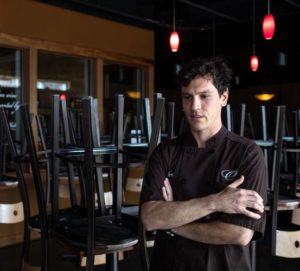Below is a recent article from the Concord Monitor. Click here to read the full article on the Concord Monitor’s website. To view this article as a PDF, please click here.

Visitors driving through Concord could see roads blocked off to traffic as early as next week and filled with masked restaurant patrons sitting at widely spaced tables.
Concord city officials are considering closing off sections of the streets downtown to allow restaurants to expand outdoor dining onto sidewalks and parking spaces, to get them to open and make enough money to stay in business once they do.
It’s a conversation that’s happening in municipalities across the country as restaurants ready to get back to business. In Manchester, for example, Peter Macone, a partner at Republic and Campo Enoteca restaurants in the Queen City, started an online petition to open up sections of Elm Street to pedestrians and dining in late April. The city of Rockland, Maine, approved a proposal Monday night to shut down all vehicle traffic on its Main Street during June, according to the Bangor Daily News.
Starting May 18, restaurants in New Hampshire can serve customers as long as they are seated at least 6 feet apart from other tables, the servers wear masks, and reservations are required to limit crowds.
These rules will greatly reduce how many customers can fit in a restaurant, reducing income.
“No way we’ll even get to 50% capacity. We’ll be lucky to seat 40%,” said Scott Ouellette, owner of Magic Foods Restaurant Group, which owns O Steak and Seafood in Concord, as well as other restaurants around the state. “Is it sustainable at 50%? No.”
Ouellette pointed out that keeping customers 6 feet apart means keeping tables at least 10 feet apart as well as removing at least half the seats from a bar. And there are many uncertainties.
“What about sitting in the booth if the back goes up past your head. Does that constitute enough of a barricade that we can have booths back to back?” he said.
Oullette noted that O’s, which can serve about 325 patrons at maximum capacity, has an outdoor area and a large sidewalk out front, benefits that many eateries in the city don’t have. Some of his other restaurants have placed tents around their buildings for diners, although he pointed out that this isn’t very useful when it snows, as it did recently.
“I feel for smaller restaurants. If you put tables 10 feet apart from each other, I don’t know how that can work,” he said.
Opening up sidewalks and street parking to tables is designed to give restaurants extra floor space at no cost. Concord City Manager Tom Aspell said his office has received requests from restaurants to move tables into the street.
The city manager has the power to temporarily shut down roads at his discretion, according to city solicitor Jim Kennedy. Aspell said he will be reviewing restaurant requests for street seating on a case-by-case basis.
Some portions of streets may need to be shut down, Aspell said. Restaurants in Eagle and Bicentennial Squares can use open space in the plazas. Restaurants with parking lots on private property can use their available parking space. In the case where outdoor dining plans conflict with required parking regulations, the community development team would work with that business owner to meet requirements, Aspell said.
“We plan to be as flexible as we can be to make sure those businesses can do the same thing as downtown can do,” Aspell said.
People eating downtown can also use “community tables” for eating takeout like the ones that already exist in front of The Works on Main Street, officials said. City officials still have to work out who will be responsible for cleaning those tables.
City Councilor Nathan Fennessy said he was happy to support outdoor dining as long as it didn’t infringe on restaurants’ ability to continue to provide curbside pickup and takeout services, or on traffic to retail stores that will also be opening up in the coming weeks.
Mayor Jim Bouley said restaurants seem willing to work with businesses around them to meet their needs.
“Not everyone is going to go forth with this,” Bouley said. “It just doesn’t make sense for some. I think that it might be fewer than originally thought.”
Bouley said restaurants are having a difficult time getting employees back to work while they are handling other responsibilities at home such as childcare. Some are collecting unemployment benefits that are above their regular pay, Bouley said.
Usually, businesses that want to rent parking spaces have to pay $15 per spot per day. However, the city council voted unanimously Monday night to waive that fee.
Councilor Byron Champlin said he has heard from constituents who hope the city council will do what it can to encourage restaurants to reopen.
“Despite the potential loss of parking revenue, I would waive the $15 fee,” Champlin said. “My reasoning is this, being able to have outdoor dining six feet apart limited to six people, these restaurants are still only going to be marginally profitable. So to the extent that the city can support their recovery from the shutdown by waiving the fee, I would be in favor of helping out our very important restaurateurs downtown.”
City Councilor Linda Kenison said she was concerned that it wasn’t fair to allow restaurants the option to use the street for free space while others don’t have that option.
“I would not waive the fee because I think there’s a fairness aspect here where those restaurants that do not have the opportunity to use parking spaces and so on, I just don’t think it’s fair without some fee for those who are able to use parking spaces,” she said.
After every other councilor spoke in favor of waiving the fee, Kenison changed course.
“Not wanting to be an outlier, I’ll say yes,” Kenison added.
